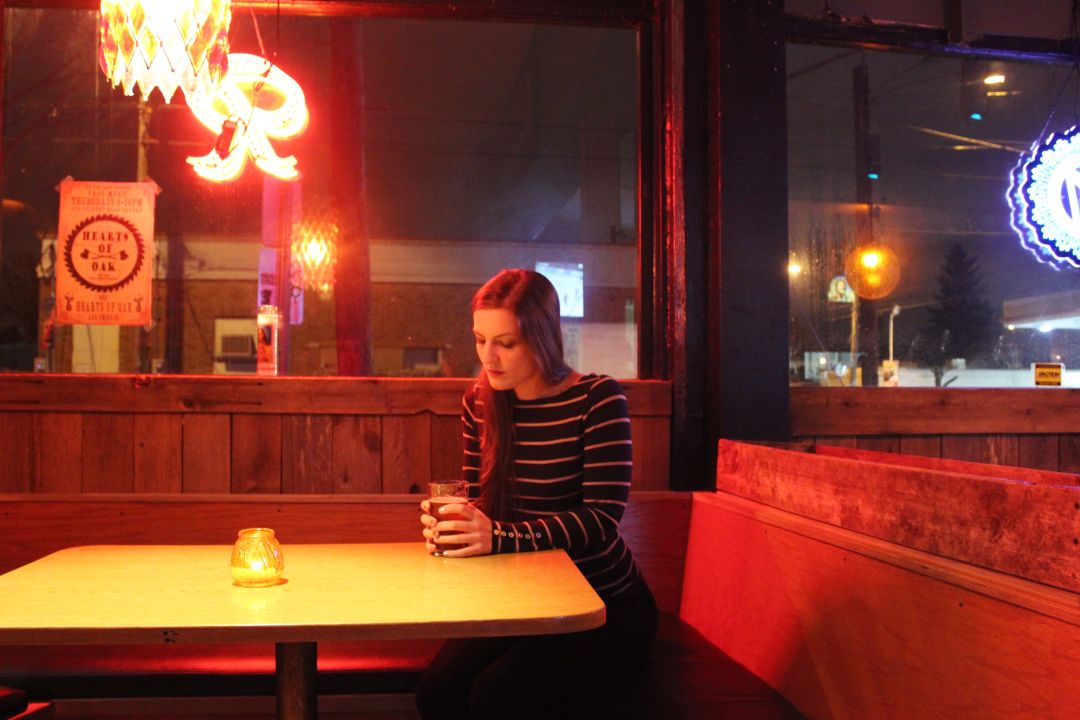In a New Play, a Noirish Detective Battles Anxiety—and Shady Portland Real Estate Deals

Zoë Rudman plays an anxiety-riddled sleuth.
Image: Pat Moran
In present-day Portland, a private investigator named Anne embarks on a missing-person case. As she pursues the trail, a break-up haunts her. Anxiety engulfs her. And, because it’s 2016 in Portland, some shady real estate dealings catch her careful eye.
That’s the premise of Hawthorne, a new, noir-tinged play at Action/Adventure Theatre. In a departure from the scrappy company’s usual serialized, semi-improvised format, Hawthorne is a scripted show, written and directed by Aubrey Jessen and Greta West. Ahead of its opening, we talked with Jessen and West about noir tropes, why this is a whimsy-free show, and what a male damsel in distress—a dude in distress, if you will—looks like.
How did the piece come about?
Aubrey Jessen: It began in February of 2015 on a day I was having a tremendous amount of trouble leaving the house—one of those days when you’re undermining yourself and battling with generalized anxiety. I just stopped at some point and was like, this is like I’m in a matched battle of wits with a shadowy nemesis inside of me. And I thought, what an interesting way to explore anxiety, through film noir. I immediately texted Greta saying, “Let’s write a detective story that explores anxiety.”
It’s a scripted show, but it was developed in collaboration with your cast.
Jessen: We came into the process not knowing all the twists and turns it would take. A lot of the world was built with our team of devisers. What do we mean when we say noir? What important storytelling elements are there? And what does anxiety mean? How do we see that manifest itself in the world?
What kinds of discoveries did you make?
Greta West: Our main character, our noir detective, experiences anxiety in a way that is very different from how Aubrey and I experience anxiety. She internalizes it profoundly—she has alienated herself from a lot of the people in her life who want to support her. It's a self-destructive, lonely anxiety. This is an archetype that goes beyond noir to excellent detectives or brilliant creators who have that drive and that isolation. She cracks the cases that she cracks because she is isolated, and because she is driven to work as an escape from how she’s feeling.
Jessen: It was also important for us to write a part that could in no way be described as quirky. We wanted a woman who was really flawed and really working on herself and not necessarily likable all the time, but still really strong—and not in any way quirky because of her anxiety or her oddness or her obsessions. It’s not whimsical. It’s a pixie-free show.
What kind of Portland do we see?
Jessen: Real estate development is a running theme. As she’s digging, she keeps finding threads that lead her to this corporation that is buying up and leasing out properties—the titular Hawthorne Company. There’s this question: is it wrong what they’re doing, or are we just projecting our feelings onto it? That’s what she has to figure out.
Is there any relationship between real estate and anxiety?
West: Anxiety colors her perception of the motivations of others—whether or not the real estate thing is wrong, or if it’s just us reacting to a growing, changing city.
Jessen: The idea that there is a greater force pulling the strings can be a comforting thought. I think we see that in all areas of life. We have people who develop these grand conspiracy theories, which can be so much easier to think about than the idea that things are happening for no reason. The idea that there’s a plan and that you have your place in the plan is comforting, even if your place is in the plan of some evil illuminati cabal.
How does the show explore gender?
Jessen: Being able to have a female antihero is a really big deal. It’s a challenge to be willing to hang a show on a woman who isn’t necessarily likable. We also wanted her to be unapologetically sexual. She’s not punished for having sex; there’s no Madonna/whore complex. It’s not central to her character—it’s just a fact that you’re allowed to be a woman who is sexual without it destroying your life.
West: The other thing we were interested in exploring was what a male damsel in distress—a dude in distress—looks like. What does a male femme fatale look like? How do we explore these traditionally female noir roles in a way that is still honest and doesn’t come off as too cartoony?
Jessen: It was really challenging. As we started digging into discussions about noir tropes and looking at the femme fatale, that’s so wrapped up in using sexuality as a weapon or a means to an end. What is the translation of that for a man? As soon as you flip the genders in noir, you immediately start making statements that you hadn’t even thought about.
So: what does a dude in distress look like?
West: When I think about classic noir, or even the penny novels with the woman being carried away with a ripped bodice, her beauty and appeal comes from her helplessness and her sexuality. The dude in distress we ended up with is a little bit of a female fantasy. He’s supportive, and is really invested in his relationship. He wants to be in a loving and equal partnership. Or maybe that’s just what Aubrey and I have as our fantasy guy. The dude in distress is not threatened by being saved by a woman, and would also like to save her, in his way, as a partner.
Hawthorne is at Action/Adventure Theatre May 12–June 4.
